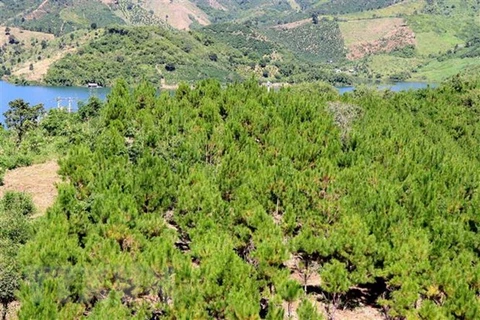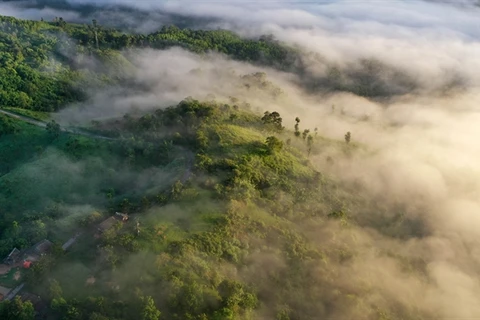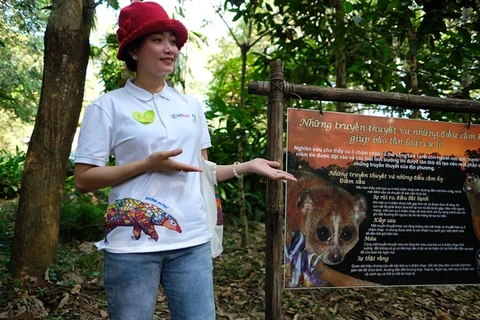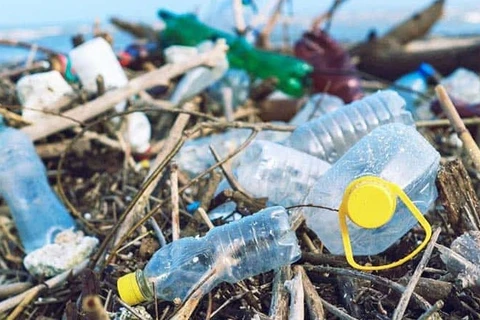Hanoi (VNA) – A workshop took place both virtually and in-person in Hanoi on October 21 to launch the Mekong Delta Coastal Habitat Conservation project, which was announced during US Vice President Kamala Harris’s visit to Vietnam in August.
The workshop was co-organised by the International Union for Conservation of Nature (IUCN), and the Directorate of Fisheries under the Vietnamese Ministry of Agriculture and Rural Development.
With a planned budget of up to 2.9 million USD provided by the United States Agency for International Development (USAID), the project, running from August 2021 to July 2024, aims to protect key coastal habitats in the Mekong Delta region of Vietnam to increase the sustainability of fisheries, enhance climate change adaptation, and improve biodiversity conservation.
By partnering with businesses, provincial governments, the management board of Phu Quoc Marine Protected Area (MPA) of Phu Quoc National Park in Kien Giang province and fishing communities, the project will work to mitigate threats to coastal biodiversity and fisheries, and enhance coastal resilience in the region.
IUCN Viet Nam Country Representative Jake Brunner said the project will help pilot and build new policies as well as open up new opportunities on finance.
Geographically, the project’s activities will focus on the delta’s lowest lying and most vulnerable coastlines along the East and West Seas, Phu Quoc MPA, and three small island clusters of Hai Tac, Ba Lua and Nam Du.
The Mekong Delta and its islands are home to 70 percent of Vietnam’s mangroves and 90 percent of its seagrass beds. Fed by the sediment and nutrients from the Mekong River, these habitats support Vietnam’s richest fishing grounds, but are also under growing threat. The delta’s mangrove forests, which provide nursery habitat for sea bass, snapper, and other commercially important species, and important protection for coastal communities from storm surges, are declining due to sea level rise. The delta’s crucial fishery habitats are further threatened by environmental pressures including prolonged droughts, rising temperatures, and aquaculture demand for groundwater, and intensive near-shore fishing which has depleted fish stocks, causing cascading ecological damage.
The main components of the project include strengthening management of Phu Quoc MPA for more effective habitat and species conservation; establishing a network of locally managed marine areas to protect coral reefs, seagrass beds in three island clusters; and exploring solutions to conserve and expand mangrove forests to increase fish nursery habitat and coastal biodiversity.
It is expected that the project’s outcomes will contribute to addressing the systemic threats in the Mekong Delta, in support of ongoing measures being taken by the Government of Vietnam, such as the revised Fisheries Law, 2018 Resolution 36, Resolution 120, and 2019 Planning Law.
Director of the Directorate of Fisheries Tran Dinh Luan said one of the current challenges is to protect the marine environment without affecting the livelihoods of local people.
The project is among concrete steps to raise people's awareness of sustainable development in coastal areas, he stated.
Quang Trong Thao, Deputy Director the Kien Giang Department of Agriculture and Rural Development, said the implementation of the project is of great significance when it looks toward the engagement of many stakeholders in protecting the living environment, such as the community, local businesses, international organisations, managers, and scientists./.
The workshop was co-organised by the International Union for Conservation of Nature (IUCN), and the Directorate of Fisheries under the Vietnamese Ministry of Agriculture and Rural Development.
With a planned budget of up to 2.9 million USD provided by the United States Agency for International Development (USAID), the project, running from August 2021 to July 2024, aims to protect key coastal habitats in the Mekong Delta region of Vietnam to increase the sustainability of fisheries, enhance climate change adaptation, and improve biodiversity conservation.
By partnering with businesses, provincial governments, the management board of Phu Quoc Marine Protected Area (MPA) of Phu Quoc National Park in Kien Giang province and fishing communities, the project will work to mitigate threats to coastal biodiversity and fisheries, and enhance coastal resilience in the region.
IUCN Viet Nam Country Representative Jake Brunner said the project will help pilot and build new policies as well as open up new opportunities on finance.
Geographically, the project’s activities will focus on the delta’s lowest lying and most vulnerable coastlines along the East and West Seas, Phu Quoc MPA, and three small island clusters of Hai Tac, Ba Lua and Nam Du.
The Mekong Delta and its islands are home to 70 percent of Vietnam’s mangroves and 90 percent of its seagrass beds. Fed by the sediment and nutrients from the Mekong River, these habitats support Vietnam’s richest fishing grounds, but are also under growing threat. The delta’s mangrove forests, which provide nursery habitat for sea bass, snapper, and other commercially important species, and important protection for coastal communities from storm surges, are declining due to sea level rise. The delta’s crucial fishery habitats are further threatened by environmental pressures including prolonged droughts, rising temperatures, and aquaculture demand for groundwater, and intensive near-shore fishing which has depleted fish stocks, causing cascading ecological damage.
The main components of the project include strengthening management of Phu Quoc MPA for more effective habitat and species conservation; establishing a network of locally managed marine areas to protect coral reefs, seagrass beds in three island clusters; and exploring solutions to conserve and expand mangrove forests to increase fish nursery habitat and coastal biodiversity.
It is expected that the project’s outcomes will contribute to addressing the systemic threats in the Mekong Delta, in support of ongoing measures being taken by the Government of Vietnam, such as the revised Fisheries Law, 2018 Resolution 36, Resolution 120, and 2019 Planning Law.
Director of the Directorate of Fisheries Tran Dinh Luan said one of the current challenges is to protect the marine environment without affecting the livelihoods of local people.
The project is among concrete steps to raise people's awareness of sustainable development in coastal areas, he stated.
Quang Trong Thao, Deputy Director the Kien Giang Department of Agriculture and Rural Development, said the implementation of the project is of great significance when it looks toward the engagement of many stakeholders in protecting the living environment, such as the community, local businesses, international organisations, managers, and scientists./.
VNA
























